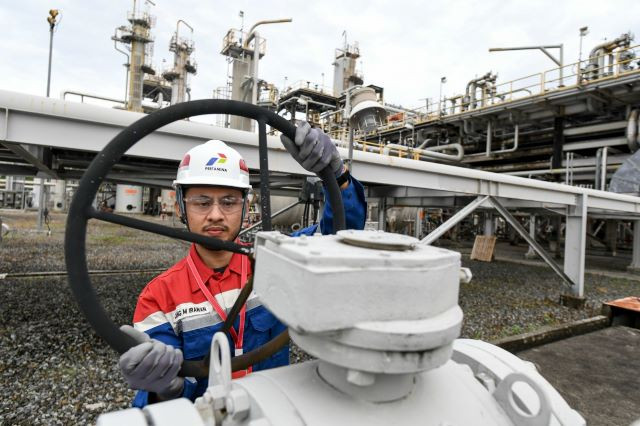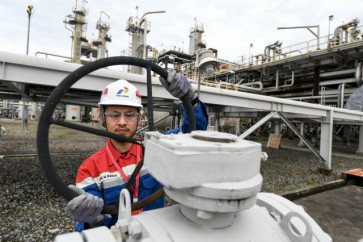Popular Reads
Top Results
Can't find what you're looking for?
View all search resultsPopular Reads
Top Results
Can't find what you're looking for?
View all search resultsWhat’s wrong with state capitalism in Indonesia?
State capitalism causes crony capitalism, wherein business success hinges on close ties between business figures and government officials.
Change text size
Gift Premium Articles
to Anyone
 Technical check: A Pertamina EP Donggi Matindok field technician checks the Central Processing Plant (CPP) facilities at the Donggi gas field on Jan. 21, 2024 in Banggai regency, Central Sulawesi. State-owned oil and gas company Pertamina topped Fortune’s list of the 100 largest companies operating in the country last year. (Antara/Hafidz Mubarak A)
Technical check: A Pertamina EP Donggi Matindok field technician checks the Central Processing Plant (CPP) facilities at the Donggi gas field on Jan. 21, 2024 in Banggai regency, Central Sulawesi. State-owned oil and gas company Pertamina topped Fortune’s list of the 100 largest companies operating in the country last year. (Antara/Hafidz Mubarak A)
T
he interplay between the state and economy is always complex and interrelated. Sometimes, the government plays minimally to support the free market but occasionally the government plays an intermediary role to regulate and ensure fair competition, and even plays maximally to control and command the market.
Nevertheless, regardless of the degree of intervention, the government's role significantly influences market outcomes, economic performance and even the political landscape.
Over the past nine years of the Jokowi administration, an industrial policy heavily leaned on state-owned enterprises (SOEs), particularly in infrastructure, mining and other strategic sectors. This reliance signals the revival of state capitalism as a catalyst for development, a growth engine and a supporter of government projects and agendas.
For almost a decade, the government has concentrated on revitalizing, reforming and restructuring SOEs. The number of SOEs decreased from 117 in 2019 to 77 in 2022, reflecting the government's efforts at restructuring through holdings, mergers and acquisitions.
In 2022, the SOEs’ assets surged to Rp 9.8 quadrillion (US$632 billion) from Rp 8.9 quadrillion in 2021, according to a 2022 report of the SOEs Ministry. Their equities also grew from Rp 2.7 quadrillion to Rp 3.1 quadrillion trillion.
Meanwhile, the SOEs’ revenues increased from Rp 2.2 quadrillion in 2021 to Rp 2.6 quadrillion in 2022. The contribution of SOEs to total state tax revenues reached 20.2 percent and other non-tax revenues reached 17.6 percent
More than that, to support state capitalism, the government also injects equity capital into SOEs, facilitates financing processes, provides incentives, establishes investment pools via a sovereign wealth fund (Indonesian Investment Authority) and strengthens resource nationalism policy.


















